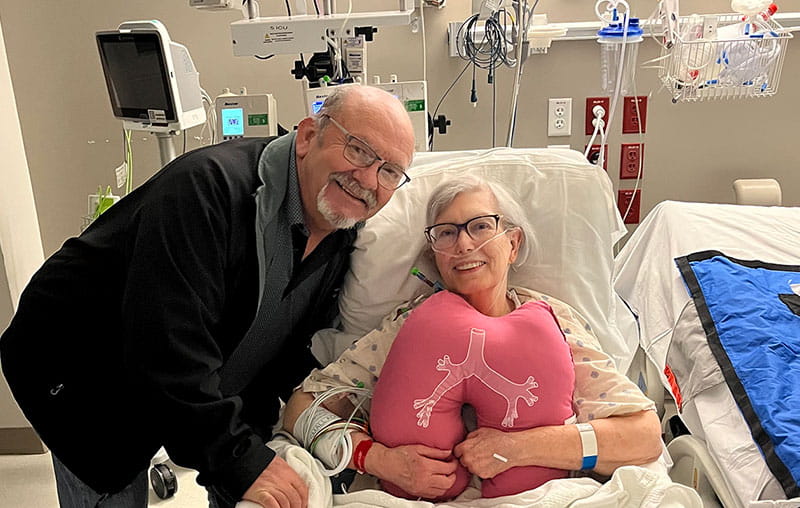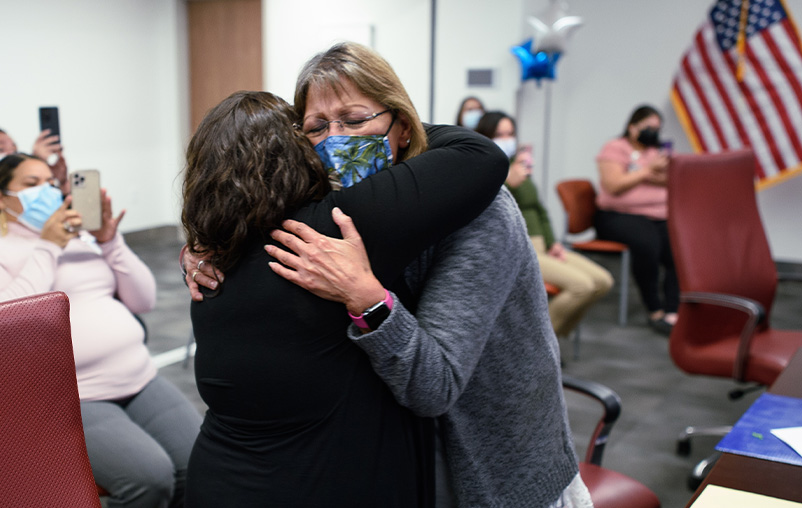Living organ donation is the best option for those waiting for an organ transplant. At University Health Transplant Institute, living donors can give a kidney or part of their liver to someone on the waiting list, either as a directed or a non-directed donation.
There are many myths and misconceptions about organ donation. The living donors with Donate Life WELD (We Encourage Living Donation) shared stories about their own experiences donating at University Health Transplant Institute.
What Inspired You to Donate?
Living donors have many reasons for wanting to donate. Some people start the evaluation process hoping to be compatible with a specific person while others donate altruistically, meaning their organ will go to a stranger who needs it.
For Julie Malone, a fellow parishioner happened to strike up a conversation with her at church one day. “He mentioned he was waiting on a kidney, and he said these magic words: ‘And my time is running out,’” Julie said. “I thought, ‘Well, I’ve got a kidney. I can do it. I can help him.’”
Dr. Kelley Hitchman, a kidney donor and University Health employee, was motivated to help her community. “I was really inspired to donate by our patients, specifically our Hispanic population, because they experience more disparity on the waitlist than a lot of other folks do,” she said. “It was very important for me to have my kidneys stay in the community where I felt like it was most needed.”
Did You Have Doubts or Apprehensions About Donating?
Some donors have apprehension during the evaluation process and in the days leading up to their surgery. But they emphasized that there was never a good enough reason not to donate if they were able.
“I had a lot of people ask me, ‘Why are you doing this?’ And I have the same response, ‘Well, why not?’” said Stephanie Lemusco, a living liver donor. “I was in a perfect position to do this. I work from home. I don't have children of my own. I really felt in my heart that it didn't matter what anybody said to me, I was going to do it.”
Becky Gallagher, a living kidney donor, said, “There was definitely some apprehension. People asked, ‘What happens if your daughter needs a kidney, what if something happens to you?’”
But Becky said she thought of the woman who would receive her donated kidney and that woman’s family. “Well, what's going to happen to this other child or this other mother? If I don't step forward, who's going to do it for her?”
What Is Recovery Like?
Depending on which organ you donate – kidney or liver – your recovery time will vary. Kidney donors tend to have a quicker recovery – about four to six weeks. Liver donors may take up to eight weeks to recover.
Depending on the physical nature of your job, you may have to wait longer to go back to work. People with office jobs or the opportunity to work from home may return to work sooner than those who must be on their feet most of the day.
Donors report experiencing some pain, trouble sleeping, fatigue, shortness of breath and constipation.
However, after recovery, donors return to their normal lives and can be as active as they were before surgery.
Can You Control Who Receives Your Organ?
Not always. While you can direct your donation, testing and evaluation may show that you and your intended recipient are not a match. In that case, you may participate in a paired exchange. This way, your organ goes to a compatible stranger, and your original intended recipient will receive an organ from someone else. This is very common.
“There are a lot of misconceptions about what makes a good donor recipient pair,” Dr. Hitchman said. “You do not have to be related to donate to somebody, and even if you are related to somebody, you might not necessarily be the best donor for that person.”
Even if a living donor is not a match for their family member or friend, they still have the opportunity to donate to a stranger. Living donors at University Health have participated in three-way donations, 10-way donations, four-way donations, and more. The transplant team will find a way to pair donors with the people who need organs.
“Isn't it a wonderful thing to let people know that they matter, and they don't have to be your brother or grandparent or child or best friend to matter and have a right to a quality of life?” said Dr. Hitchman.
Can You Donate More Than One Organ?
Yes, you can donate one kidney and part of your liver, though not at the same time.
Kym Rakowitz altruistically donated a kidney in December 2021. “The next day after donating my kidney, I woke up and said, ‘I'm going to donate my liver.’ That’s what's next for me because this was a breeze,” she said.
In June 2023, she donated 67% of her liver, also to a stranger. “I love to share my story,” Kym said. “People are amazed that you can even be a living donor, let alone be a double living donor.”
Do You Meet the Person Who Received Your Organ?
You can, if both parties agree to it. University Health hosts transplant reveal events, where donor and recipient meet each other for the first time.
“I've met both of my recipients, and I am very, very close to my kidney recipient,” Kym said. “It's so overwhelming to see the good that we put back into the world and to people that we don't even know.”
What Do You Wish You’d Known before Donating?
“I think University Health did a wonderful job educating us on what to expect as best that they could,” Becky said. “But I think what I was missing was that one-to-one mentorship of someone sharing what their experience was like.”
Donate Life America’s WELD is a community-based peer-to-peer program. People considering living donation can contact Shanna Puente, assistant director of the Champion for Life program at University Health Transplant Institute, for more information about our local WELD chapter. Peer mentors can share their living donation stories, what to bring to appointments, what to expect after surgery, and more.
Become a Living Donor at University Health
Learn more about how to become a living donor with University Health.




